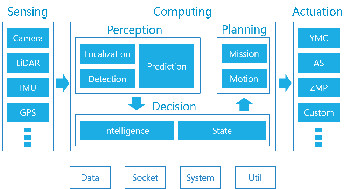Open source autonomous driving project to build on 96Boards SBCs
Dec 10, 2018 — by Eric Brown 1,692 views Linaro, Tier IV, and Apex.AI have co-founded an Autoware Foundation to establish an open source platform for autonomous vehicles built around Tier IV’s Linux/ROS based Autoware stack and some future 96Boards SBCs.
Linaro, Tier IV, and Apex.AI have co-founded an Autoware Foundation to establish an open source platform for autonomous vehicles built around Tier IV’s Linux/ROS based Autoware stack and some future 96Boards SBCs.
Japan-based intelligent vehicle technology company Tier IV has joined with Arm-backed Linaro and autonomous driving software firm Apex-AI to launch the Autoware Foundation. The not-for-profit organization will develop open source hardware and software built around the Linux and ROS based Autoware software developed by Tier IV, which sells small electrical vehicles (EVs) that run Autoware.
The Autoware Foundation will “initiate, grow, and fund open source collaborative engineering Autoware projects, starting with Autoware.AI, Autoware.Auto, and Autoware.IO,” says Linaro. Autoware.AI is the original autonomous vehicle stack developed by Shinpei Kato at Nagoya University. Kato then founded Tier IV and rewrote Autoware.AI with ROS 2.0 to create Autoware.Auto, which will run on Tier IV’s upcoming autonomous mini-EV, Milee, as well as a cargo-only logistics vehicle called Logiee.


A render of Tier IV’s Milee autonomous EV (left) and the original Nvidia Drive PX 2 board
(click images to enlarge)
Autoware is designed primarily for urban driving under 40MPH. Both vehicles run the Autoware.Auto stack on Nvidia’s Arm-powered Drive PX2 mainboard for autonomous vehicles. (x86-based versions are also available.)
— ADVERTISEMENT —
Autoware.IO appears to be the newest package, and the one where Linaro will play the biggest role. The product offering will include “heterogeneous platform support based on 96Boards products, vehicle control interfaces, as well as a collection of third-party software and hardware tools,” says Linaro. Autoware.IO projects include “simulators, device drivers for sensors, by-wire controllers for vehicles, and hardware-independent programs for SoC boards.”
The Autoware Foundation’s founding Board of Directors comprise three individuals, each of which is associated with a particular academic institution: Kato and the University of Tokyo, Jan Becker from Apex.AI and Stanford University, and Yang Zhang from Linaro 96Boards and the Chinese Academy of Sciences AI Institute.
A separate Technical Steering Committee is being formed from representatives of the foundation’s Premium Members, which also include Arm, AutoCore, AutonomouStuff, Huawei, Kalray, LG, Parkopedia, StreetDrone, and Velodyne. Academic & Non-Profit Members including eSOL, Intel, Nagoya University, OSRF (Open Source Robotics Foundation), RoboSense, Semi Japan, SiFive, TRI-AD (Toyota Research Institute Advanced Development, Inc), and Xilinx.

Autoware architectural diagram
(click image to enlarge)
Autoware is already used by more than 100 companies in more than 30 vehicles. The GitHub-hosted, BSD-licensed platform comprises self-driving modules composed of sensing, computing, and actuation capabilities, with specific support for camera, LiDAR, IMU, and GPS for navigation systems.
Localization features are enabled via 3D maps and SLAM algorithms in combination with GNSS and IMU sensors. Detection algorithms are linked to cameras and LiDARs “with sensor fusion algorithms and deep neural networks,” says Tier IV. Prediction functions are based on the output of the Localization and Detection modules. The platform is available with a ROSBAG-based simulation environment for users lacking a Drive PX2 development kit.
There’s no mention of Linux in the Linaro announcement, but Drive PX2 runs Linux, and ROS is typically paired with Linux for higher-end projects beyond MCUs. Linaro is a Linux/Android tools company for Arm devices, and almost all 96Boards SBCs run Linux.
The Apex-AI connection is a bit unclear. The Palo Alto based company offers an autonomous vehicle-oriented fork of Robot Operating System (ROS) 2.0 called Apex.OS. The software is primarily designed to run Linux, although it also supports Windows and QNX. Apex-IO co-founder and CTO Dejan Pangercic is a major Autoware contributor.
Several open source autonomous driving software projects have emerged, including the openpilot driving agent, but this is the first comprehensive, open source autonomous driving stack we’ve seen. Some other mostly open self-driving platforms are summarized in this TTN story. Meanwhile, the Linux Foundation’s open source Automotive Grade Linux in-vehicle infotainment project has plans to eventually move into autonomous vehicles.
Linaro offered no details as to whether the 96Boards platforms for Autoware will be released as part of an official 96Boards Automotive Edition spec. Linaro recently mentioned an upcoming 96Boards Industrial Edition spec in a partnership announcement with the Industrial Internet Consortium.
“An open source project of this scope needs to be independent from a single company and must embrace the community supporting it,” stated Jan Becker, Director on the Board of the Autoware Foundation and Co-Founder and CEO of Apex.AI. “Therefore we are following the example of the Linux Foundation and Open Robotics by putting all Autoware projects under the roof of this foundation.”
Further information
More information on the Autoware Foundation may be found in the announcement, as well as the new Autoware.org website, the Autoware GitHub page, the Tier IV website, the Apex.IO website, and Linaro’s automotive page.

Please comment here...